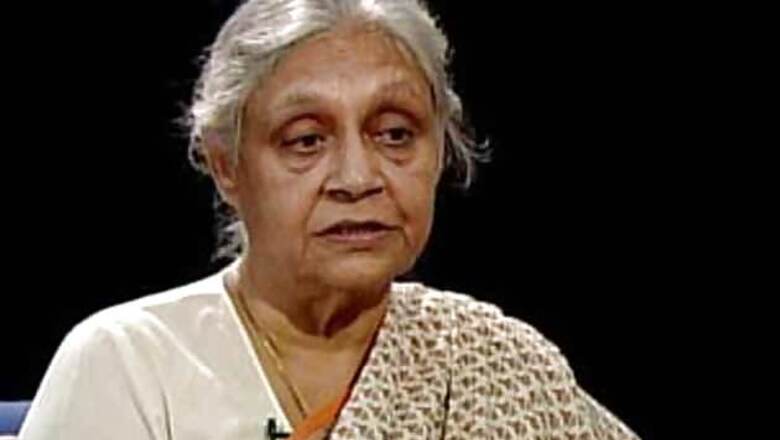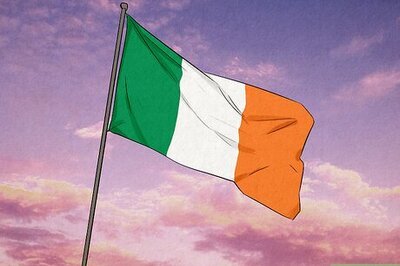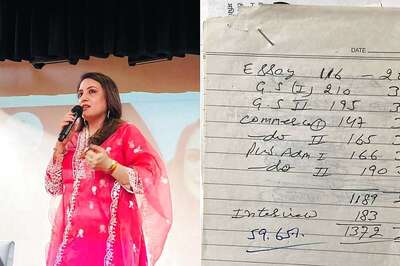
views
Amid mounting attack on the Delhi government by BJP and Aam Admi Party over water scarcity, Chief Minister Sheila Dikshit on Friday admitted that it was a matter of "shame" that many parts of the city had to reel under water shortage. "Many parts of Delhi do not get water and it is a matter of shame for us. We do not have water. What can we do?" Dikshit said, addressing a function organised by industry chamber Assocham.
The Chief Minister blamed Haryana for water crisis in Delhi and accused the neighbouring state of not honouring its commitment to supply 80 mgd (million gallons per day) water from the Munak canal. Describing the situation as "tough", Dikshit said inspite of severe water crisis, her government managed to give "some water" to the citizens by ensuring equitable distribution. "At least, I have not heard anybody saying that someone died because he was thirsty," she said.
The Munak canal was constructed by Haryana with financial assistance of around Rs 400 crore given by the Delhi government on the condition that the national capital will be supplied 80 mgd water from it. But later, Haryana refused to supply water to the city. As both sides failed to settle the dispute, the Prime Minister had set up a GoM headed by then Home Minister P Chidambaram in 2011. Another GoM headed by Home Minister Sushilkumar Shinde was set up by the Prime Minister couple of months back after both the states refused to accept the recommendations of the previous GoM.
"We spent lot of money and acquired land for construction of a tunnel to bring water from Haryana. The tunnel has been constructed but it is lying unutilised for past seven years. There is a huge tussle going on (between Haryana and Delhi). Haryana says it will not give water. These are issues in which we do not have any control," Dikshit said. The current average demand of potable water in Delhi is around 1,100 mgd (million gallons per day) and currently Delhi Jal Board supplies around 800 mgd water across the city after treating raw water in its treatment plants.
The demand is projected to touch around 1,400 mgd by end of the 12th Five-Year Plan in 2017. Delhi relies heavily on neighbouring states such as Haryana and Uttar Pradesh for the supply of raw water
In her address, Dikshit launched a fresh attack on the Delhi Police saying the force has not been able to improve security of women in the city. She said women are still scared of going to police stations to register their complaints and there was a need to improve training of the force.
"We need to train our policemen to be responsive. Sensitivity of policing should be much, much more than what is right now. Today people are scared to go to police station. Women do not go to a police station to register a complaint because they are scared. The training of police has to be improved," Dikshit said. The chief minister also asked the society to change mindset towards women and exhorted each and every citizen to do whatever possible to ensure safety of women.
"The society will have to change its mindset towards women. Depending entirely on police to protect the women will be kind of asking for the moon. We cannot get the moon. So let us do something at our end," the Chief Minister said. The Chief Minister, speaking on a range of issues, identified multiplicity of authorities as "biggest hurdles" faced by her in the last 14 years as chief Minister. "I have no hesitation to say that there is enormous multiplicity of authorities in Delhi. We have municipal corporations which are somewhat under us and somewhat under the Union Home Ministry. Police is not with us.
"We do not have authority over land. We have number of other institutions and authorities like the Delhi Urban Art Commission whose clearance is mandatory for implementing various projects," she said. Giving an example, Dikshit said even though the Lutyens Bungalow Zone falls under her New Delhi constituency, it is very difficult even for her to implement any project in the area as clearance has to be taken from a number of authorities.
Asked why she does not put pressure on the Central government headed by Congress to grant Delhi the status of full-statehood, Dikshit said it is a difficult issue and it does not matter which party was ruling at the Centre. On failure of the government to rid the city of slums, Dikshit said often politicians also do not want to take decisions which may affect their "vote bank" and termed it as "unfortunate".
"Politicians think of their vote bank. That is why at times it is difficult to take unpopular decisions," she said. Listing her achievements during her 14-year tenure as Chief Minister of Delhi, Dikshit said the Congress government tried to follow Jean-Jacques Rousseau's philosophy of helping people according to their needs. "Our government's philosophy has been to reach out to people who need to be reached out," she said.
Accusing Aam Admi Party leader Arvind Kejriwal of misleading people of the city on the power issue, she said power bills have gone up due to rise in power consumption. "If you use an air conditioner than you will have pay for it. Your bill is going to go up. But Kejriwal does not understand it. As per a media report, electricity connection in his house in Ghaziabad was snapped by the authorities. But he restored it," Dikshit said.




















Comments
0 comment